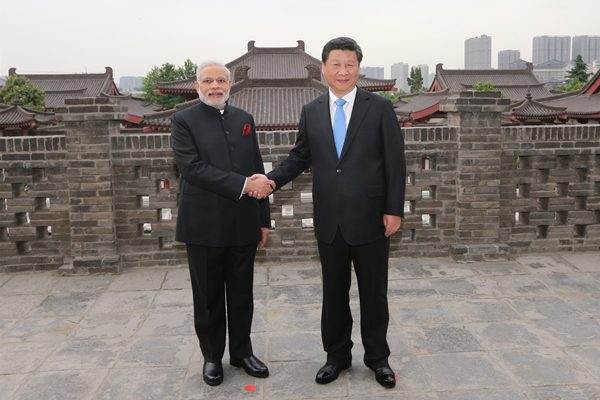

 |
| President Xi Jinping shakes hands with Indian Prime Minister Narendra Modi during their visit to Daci'en Temple in Xi'an, Shaanxi province, on Thursday. [Photo/Xinhua] |
Those who base their thinking on old logic to judge China-Indian ties, and those who like to present India as a power to counter China's geopolitical influence, will not enjoy the sight of the dragon dancing with the elephant.
Indian Prime Minister Modi's recent visit to China has attracted worldwide attention. Every handshake between the leaders of the two major powers in Asia always adds fresh impetus to the stories of an Asian rise in the 21st century. But it also leaves those who cling to the "China-India confrontation" concept with a sour feeling.
An article titled "India vs. China: mistrust opponents" published on May 14 in Die Zeit, the German weekly newspaper, raised three questions: Who is stronger? In which country do people enjoy a better life? The future belongs to whom? Readers might easily have cast their minds back to the sensational headline "China and India: Contest of the Century" published in The Economist on April 19, 2010.
For two Asian countries with a long history of exchanges, five years is a brief moment. But even in the short period of five years, the pace of Sino-Indian cooperation has gone far beyond the understanding of western media who are still stuck in the "confrontation era".
In 2010, bilateral trade between the two countries amounted to only 56 billion US dollars, while in 2014 the figure exceeded 70 billion. A total of 24 cooperation documents have been signed during Modi's visit. They cover areas from railway, mining, aerospace, and education to think tanks, which shows that the all-round nature of cooperation between the two is moving forward.
Obviously, those who base their thinking on old logic to judge China-Indian ties, and those who like to present India as a power to counter China's geopolitical influence, will not enjoy the sight of the dragon dancing with the elephant.
So forecasting Sino-Indian future through a "conversion formula" may get us closer to the reality.
According to a European reporter, bilateral trade between Germany and France in 2014 was three times that of China and India, while the combined population of the latter is 17 times that of Germany and France. Besides, among more than 100 million outbound Chinese travelers, only 1 percent went to India. These figures, indeed, can be used to illustrate the "distance" existing between China and India, but it also shows there is huge space to develop bilateral cooperation.
From the historical view, both China and India face opportunities to realize national rejuvenation and there exist both huge potential and the conditions for a leap forward in bilateral relations. Luckily, the two sides have reached an important consensus to advance the strategic partnership and build closer relationships.
Both leaders envisage that China and India will integrate their future development strategies and achieve complementarity and mutual assistance at a higher level between the two economies, which will also enable China and India continue to be important engines behind regional and global economic growth.
The combined economy of China and India has surpassed 12 trillion US dollars. It is predicted that the growth of both countries in the future will reach or exceed 7 percent. Meanwhile, the population of the two countries accounts for 40 percent of the world total. Whenever the two neighbors achieve integration in any economic sphere or in any industry, it will create an unprecedented market and a value chain beneficial to both.
There is competition and there are differences between China and India, but there is more cooperation. Expanding cooperation is a rational choice for both. Those who indulge in rivalry mentality should look up the reality.
The author is Ding Gang, a senior editor with People's Daily.
This article was edited and translated from 《对决”逻辑难以领略龙象之舞(国际论坛)》, source: People's Daily
 J-11 fighters in air exercise
J-11 fighters in air exercise Beauties dancing on the rings
Beauties dancing on the rings Attendants-to-be join Mr. & Miss Campus Contest
Attendants-to-be join Mr. & Miss Campus Contest Beijing's toughest anti-smoking law takes effect
Beijing's toughest anti-smoking law takes effect Family lives in cave for about 50 years in SW China
Family lives in cave for about 50 years in SW China PLA soldiers operating vehicle-mounted guns in drill
PLA soldiers operating vehicle-mounted guns in drill Blind carpenter in E China's Jiangxi
Blind carpenter in E China's Jiangxi China hosts overseas disaster relief exercise for the first time
China hosts overseas disaster relief exercise for the first time 20 pairs of twins who will become flight attendants in Sichuan
20 pairs of twins who will become flight attendants in Sichuan Obama is sowing discontent in S.China Sea
Obama is sowing discontent in S.China Sea Rescuers work through night to reach cruise ship survivors
Rescuers work through night to reach cruise ship survivors Driving through limbo
Driving through limbo Facing down MERS
Facing down MERSDay|Week